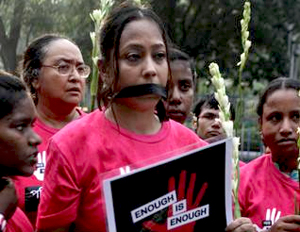
New Delhi, Aug 26: Lok Sabha today witnessed outrage over the gangrape of a young photo-journalist in Mumbai with many members demanding death for the culprits, as Home Minister Sushilkumar Shinde assured them of expeditious action against the accused.
His assurance came after Leader of the Opposition Sushma Swaraj asked whether any time-frame has been set for prosecuting those found guilty of the crime, while pointing out that those accused in the December 16 gangrape in Delhi had not yet been sentenced.
"You hang one or two of these beasts fast ... and these incidents will stop," an agitated Swaraj said amid thumping of desks and support by several members from various parties.
Assuring the agitated members that Maharashtra government would do its utmost to expeditiously prosecute the accused, Shinde condemned the incident and informed the House that all the five culprits have been arrested.
"Public order and police are subjects exclusively dealt with by the states. The state government of Maharashtra will do its utmost to complete the investigation of the crime and prosecute the accused under law expeditiously," Shinde said.
In a shocking incident on August 22, a photo journalist was raped in South Mumbai. Since then, the police have collected evidence and completed medical and forensic examination as well as spot evaluation, he said.
Reminding the government of the Delhi gangrape, Swaraj lamented that the case has not been expedited.
"I am saddened that the Damini (Delhi gangrape victim) case has not been expedited. Hang one or two (of the culprits) ... such incidents will stop," she said amid thumping of desks by various members.
"It seems there has a been a flood of such incidents in different parts of the country since then," she said.
While Harsimrat Kaur Badal (SAD) demanded death penalty to all such culprits, JD(U) chief Sharad Yadav condemned the incident and demanded action against self-styled godman Asaram Bapu, against whom a complaint of rape has been lodged by a teenaged girl.
CPI leader Gurudas Dasgupta pointed out that many such incidents were occurring in various places, including Jharkhand where a woman constable was raped recently. He also shouted "Hang Asaram".
In response to the demands by members, Shinde said in Damini's case, the trial was going on a day to day basis.
With regard to Mumbai gangrape incident, the Minister said the matter would be expedited and taken to a fast track court.
Normal 0 false false false EN-US X-NONE X-NONE
/* Style Definitions */
table.MsoNormalTable
{mso-style-name:"Table Normal";
mso-tstyle-rowband-size:0;
mso-tstyle-colband-size:0;
mso-style-noshow:yes;
mso-style-priority:99;
mso-style-parent:"";
mso-padding-alt:0in 5.4pt 0in 5.4pt;
mso-para-margin-top:0in;
mso-para-margin-right:0in;
mso-para-margin-bottom:10.0pt;
mso-para-margin-left:0in;
line-height:115%;
mso-pagination:widow-orphan;
font-size:11.0pt;
font-family:"Calibri","sans-serif";
mso-ascii-font-family:Calibri;
mso-ascii-theme-font:minor-latin;
mso-hansi-font-family:Calibri;
mso-hansi-theme-font:minor-latin;
mso-bidi-font-family:"Times New Roman";
mso-bidi-theme-font:minor-bidi;}
Outrage in LS over gangrape of photo-journalist in Mumbai
New Delhi, Aug 26: Lok Sabha today witnessed outrage over the gangrape of a young photo-journalist in Mumbai with many members demanding death for the culprits, as Home Minister Sushilkumar Shinde assured them of expeditious action against the accused.
His assurance came after Leader of the Opposition Sushma Swaraj asked whether any time-frame has been set for prosecuting those found guilty of the crime, while pointing out that those accused in the December 16 gangrape in Delhi had not yet been sentenced.
"You hang one or two of these beasts fast ... and these incidents will stop," an agitated Swaraj said amid thumping of desks and support by several members from various parties.
Assuring the agitated members that Maharashtra government would do its utmost to expeditiously prosecute the accused, Shinde condemned the incident and informed the House that all the five culprits have been arrested.
"Public order and police are subjects exclusively dealt with by the states. The state government of Maharashtra will do its utmost to complete the investigation of the crime and prosecute the accused under law expeditiously," Shinde said.
In a shocking incident on August 22, a photo journalist was raped in South Mumbai. Since then, the police have collected evidence and completed medical and forensic examination as well as spot evaluation, he said.
Reminding the government of the Delhi gangrape, Swaraj lamented that the case has not been expedited.
"I am saddened that the Damini (Delhi gangrape victim) case has not been expedited. Hang one or two (of the culprits) ... such incidents will stop," she said amid thumping of desks by various members.
"It seems there has a been a flood of such incidents in different parts of the country since then," she said.
While Harsimrat Kaur Badal (SAD) demanded death penalty to all such culprits, JD(U) chief Sharad Yadav condemned the incident and demanded action against self-styled godman Asaram Bapu, against whom a complaint of rape has been lodged by a teenaged girl.
CPI leader Gurudas Dasgupta pointed out that many such incidents were occurring in various places, including Jharkhand where a woman constable was raped recently. He also shouted "Hang Asaram".
In response to the demands by members, Shinde said in Damini's case, the trial was going on a day to day basis.
With regard to Mumbai gangrape incident, the Minister said the matter would be expedited and taken to a fast track court.
Normal 0 false false false EN-US X-NONE X-NONE





Comments
Add new comment